- Home
- Annelie Wendeberg
River of Bones Page 5
River of Bones Read online
Page 5
* * *
I stuffed the newspaper into my briefcase, and stepped from the hansom cab onto North Grove Street. I’d never been to the Boston City Morgue, but it appeared no different from the morgues I’d seen in London: A one-storey building tucked away in an alley with odours of death and disinfectants wafting from it. Stray cats loitered nearby, hoping to catch sight of a mortician or assistant dumping the contents of a metal bucket out of the back door.
The morgue’s entrance door stood ajar. I stepped through and peeked into a corridor. A family of three — a father, mother, and a small boy — blocked my view of the receiving room. The father was shaking his head no to the boy request to prod the dead man’s stomach. The parents muttered together before tugging the boy away from the gruesome sight. The family walked past me and we all nodded in greeting. The stink grew intense as I neared the rear section of the building. Two bodies were laid out in what looked like a prison cell.
A man with a soft waist, a walrus moustache, and a healthy shock of brown hair asked me if I was there to identify a body. There was a twinkle in his warm eyes that seemed at odds with the interior decoration.
I shook my head. ‘Professor Goodman expects me. Dr Arlington is my name.’
‘Armand Fournier,’ the man said with the faintest accent and offered his hand. ‘I’m the mortician. Come this way, please.’
He showed me into a small operating theatre and left. A metal table in the centre of the room was surrounded by three men, their hair and moustaches in various states of greying. The two tiers of horseshoe benches that rose behind them were populated by half a dozen young men, who smoked and chatted. Above them, sunlight dropped through an expansive skylight, cutting through swirls of dust, sweltering heat, and the thickly sweet scents of decomposition.
Anyone who’d ever caught a glimpse of a putrefying body learned the hard way that the stench is far more repulsive than the sight, that nothing punches sinuses, lungs, and mind as hard as the combined odours of excrements fermenting inside a bag of rotten meat. Nothing causes such deep revulsion, such utter alarm and an overwhelming urge to flee. And every tiny molecule of those scents is carved into memory. No one ever forgets the perfume of death.
A man in his fifties was resting a hand on the corpse’s forehead and addressing the audience. ‘Death due to a fall from great height may be attributed to accident, suicide, or homicide. It’s difficult to differentiate the three, and especially so in this case. If you would help me move him onto his side,’ he muttered to the two men next to him. They tugged on shoulder and pelvis, exposing the back of the body to the students. ‘Advanced decomposition. A great number of excessive blunt force injuries. No witnesses. You can roll him back now.’
‘Remains to be seen,’ — one of the men in the audience bellowed — ‘at the morgue.’ Several others chuckled. That joke must have been decades old. I’d heard it much too often to find it amusing.
One of the students mumbled together and nodded in my direction. Silence fell. I strolled up to the metal table, scanning the corpse and the gentlemen prodding it.
‘You must be Dr Arlington.’ The man leading the autopsy threw a brief glance at me. Grey eyes sharpened behind spectacles. He was broad around the middle, and the top of his head was bald. His hair and beard were neatly trimmed. ‘I’m Professor Goodman, the head medical examiner. You can put your things on one of the benches over there.’
Surprised, I slung off my briefcase and jacket, and rolled up my sleeves. Despite the progressiveness of the Bostonians, I kept expecting protests or at least some degree of displeasure, when taking my place beside men in an operating theatre. Professor Goodman, though, seemed to have no qualms. I suspected that my disguise was a factor. Not that I was disguised. Everyone could see I was a woman, just not an obviously feminine one. I wore a shirt and trousers. Stiff collar. No buffs, no frills.
From the corner of one’s eye, I might have been mistaken for a male.
‘Inspector McCurley told me you are a physician and a consulting detective. You don’t look like you intend to be sick, so I assume he wasn’t lying.’ Professor Goodman winked at me.
I nearly choked at the term consulting detective. It brought back memories of my life back in London, and the man who’d probably coined that very term.
‘The police occasionally consult me, yes, but I would describe myself as a physician only.’ I walked around the table, inspecting the body that had yet to be opened. Leathery, dark brown skin was tightly stretched over bloated flesh. A lancet poked up from his abdomen, a bluish flame flickering atop it. Dirt and clothes had been removed from the body, as had most of the fly larvae.
‘Solving crimes is a hobby of yours?’ Goodman asked without looking up.
I smiled. Quinn had once told me that he deplored people who played detective. And I had played detective frequently. ‘I have yet to ask the police for payment for my services. I guess that makes it a hobby?’
Goodman’s eyebrows shot up his forehead.
I slipped my fingers along the side of the abdomen and pushed around the shoulders, ribcage, and hip. Bone fragments were shifting. I ran my hands along the neck and beneath the skull. My fingertips sunk into a soft, splintery mess. ‘Is there anything left of the brain?’
‘Would you like an apron?’ Mr Fournier appeared at my side, holding out a fresh, white apron.
I held out my arms to him. ‘Would you mind?’
Without blinking, he slipped the apron over my arms and head, and tied it at my back.
‘Thank you.’
He gave me a nod.
‘Most of it was eaten by maggots,’ Professor Goodman said with a nod to the corpse’s head. ‘You were the woman who took the temperature of the first Railway Strangler victim, weren’t you?’
‘Hm-mm.’ I wiped the gore off my fingers and crossed my hands behind my back. ‘Would you mind walking me through the results of your external examination?’
‘The inspector hasn’t given you… Ah, of course not. We rarely give out preliminary reports. These two chaps are Drs Musgrove and Walten, by the way.’ Goodman pressed his fists into his hips and stretched his back until it crackled.
Musgrove and Walten narrowed their eyes a fraction. Ah, there was the discomfiture I’d been missing.
‘I must apologise for the state of this morgue,’ Goodman grumbled. ‘If we’re lucky, the Board of Health might invest in a new wing. Or in regular deliveries of ice, because, in theory, the soapstone slab in the receiving room can be refrigerated. But there isn’t even enough money to get window cleaners to scrub the pigeon droppings off the skylight. I fear any improvements will have to wait a decade. Possibly five. And they expect us to solve a murder singlehandedly in ten minutes. I wish we were as progressive as the French. Transplanting the Lyons School of Criminology to Boston would be a dream come true.’
Now that was a pleasant surprise. ‘You follow Alexandre Lacassagne?’
‘Of course, I do! Do you know him?’
‘Not personally, no. I don’t speak French, so I rely on translations of his works into English or German.
‘Ah! I was wondering about your accent. You are German?’
‘I grew up in Germany.’
‘Interesting, interesting,’ muttered Goodman, and threw a glance around the room. ‘A little grouchy, but an excellent investigator.’
‘Who?’
‘Your Inspector McCurley.’
‘He is not my…’ I shook my head.
Professor Goodman coughed. ‘Now, you must know that not everyone agrees with me on the superiority of Lacassagne’s research. Dr Walten here, still believes Lombroso’s theories have value, for example. The fool — Lombroso, that is — just published a study you might find as repulsive as I. It is titled “The Female Offender,” and describes the impulses ruling the minds of women criminals. And prostitutes as well. He sees women as underdeveloped and unevolved — primitive version of men.’
I snorted.
&nbs
p; ‘It amuses you? Well, I guess humour is sorely needed when scientists aim their ridiculous opinions at you.’
I shrugged, hiding the anger that roiled in my stomach. ‘A scientist whose only goal is to prove his own hypotheses, but never tries to disprove them, is not a scientist. He might rather be compared to a showman or even a clergyman. That buffoon Lombroso is not alone in his beliefs and outdated methods. Many anthropologists, Darwin included, believe that women are less evolved than men. And so they measured hundreds upon hundreds of skulls to show that, on average, the skulls of women are smaller than those of men. But none of those scientists actually measured intelligence. None of them was able to find a shred of evidence for a correlation between intraspecific variations in brain size and intellect.’ I could have gone on and on. But long-winded, angry speeches rarely had the effect of making people see my point.
Goodman used his wrist to push his spectacles up his nose, then looked sharply at his students. ‘And that, dear chaps, is why we would do well to welcome more women into our midst.’
I was as stunned as everyone else in the room. Faces fell. Diplomacy didn’t seem to be Goodman’s forte. I was liking him very much already.
Again, he winked at me. ‘Now, you asked for the results of the external examination. Nothing unusual or surprising there. Open fractures of the skull, spine, and pelvis. Hematoma and abrasions along the length of the trunk. All the injuries are confined to a single surface plane of the body — the back to be precise — on which he fell. Faint postmortem lividity is present on his left side. He bled out pretty fast. No hesitation marks or grab marks. Several small tears in his shirt and vest.’
I nodded. Hesitation marks, such as scarring of the wrists, would have pointed to a history of suicide attempts. Grab marks would indicate that the man had been dragged to a bridge, a balcony or the like, and pushed off. ‘Are the tears in his clothes from transporting the body, or from the impact?’
‘Most likely from grabbing and transporting it. Please light the flue for us now, Dr Musgrove.’ At that, Professor Goodman clapped his gory hands and announced the autopsy would begin.
Musgrove held a match to a large, funnel-shaped box below the table upon which the corpse lay. There was a hiss of gas. Puzzled, I cocked my head at him.
‘The flame produces a downward draught through the perforated table, carrying off most of the disagreeable odours,’ Dr Musgrove explained.
‘In theory,’ added Professor Goodman, and signalled to Dr Walten, who picked up a knife and sliced the body open from chin to pubic bone. The stench was unbearable. Sweet, thick, heavy. Coating everything from my clothes to my eyeballs. Or so it felt.
The urge to vomit tickled my tongue. That reflex had always been there and would always stay with me. I’d learned to control it when I witnessed my first postmortem more than a decade earlier. Forcing the back of my mouth and throat to relax, I blinked once and focused on the matter at hand.
The list of internal injuries was long. Ruptures of several of the large blood vessels. Cardiac, bronchus, liver, and spleen ruptures. Fractures of the ribs, pelvis, shoulders, neck, and skull. The impact had shredded the brain, killing the man instantly.
Dr Walten bottled samples of the maggot and brain tissue mixture, and of the decomposed remains of heart, liver, and stomach contents for the toxicologist.
‘We took samples of the fauna when the body arrived at the morgue,’ Goodman told me several hours later after we had shed our aprons and scrubbed the gore off our hands and forearms. ‘The microscopist has identified each of the species and their developmental stages, and is now comparing these to the most recent study of the Parisian entomologist Jean Pierre Mégnin. I’m in regular communication with him. With Monsieur Mégnin, that is. He is developing a timetable, a study which he calls “Fauna of Tombs,” which describes the succession of arthropods colonising corpses. Beetles, mites, flies, and so on. Extraordinarily interesting! I have each of his letters translated, and make copies for my students.’ He looked from me to the small crowd of men. ‘Colmer!’ he barked. ‘Give your copy to Dr Arlington.’
I cringed at Goodman’s lack of finesse. ‘I couldn’t possibly accept—’
‘Hurry up, Colmer. You’re never going to read it anyway.’
With a fiery red face, the young man fumbled with his notes, extracted a narrow folder, and brought it over to me.
‘Thank you. I’ll return it—’
‘Never mind.’ Colmer looked past me to shoot a glare at Goodman.
‘Now,’ the professor continued undisturbed, ‘Monsieur Mégnin is finding that the succession of insect species and their developmental states is highly predictable and can aid in pinpointing time of death.’
I glanced down at the notes in my hand. One sentence struck me at once. The workers of death only arrive at their table successively and always in the same order.
‘Fascinating,’ I breathed, and received a pointy elbow to my side.
‘It is, isn’t it?’ Goodman grunted good-naturedly, and told his assistants to peel all the flesh off the bones by the following morning, and, while doing so, to repeat the examination of every square inch of skin for marks that might help identify the corpse. ‘Your Inspector has an inkling. So we are checking twice. Drs Musgrove and Walten will once again catalogue each scar, and add any old fracture to the list.’
‘What about dental work?’
He shook his head. ‘Nothing. He had unusually healthy teeth for a man of his age. No cavities or missing teeth, no signs of rickets or congenital syphilis. No stains that would indicate heavy smoking, and no wear marks from the stem of a pipe.’
* * *
I left the confines of North Grove Street and its morgue, tipped my face at the afternoon sky and let the cool breeze dry my sweaty temples. Dr Walten’s farewell was a dull echo in the back of my head. When Professor Goodman was out of earshot, Walten had bent close to me and hissed, ‘How do you justify taking the post of a qualified man?’
I’d smiled at him. Not too long ago, that same question would have been yelled at me in front of my peers had anyone known I was masquerading as a male physician. Now, though, men like Walten had to mutter their beliefs behind shut doors. Men like Walten were outdated. Dinosaurs. And in a decade or two, they’d be mere side notes of history, the ridicule of the human species.
Yes, sometimes I wallowed in naive hope.
I filled my lungs with fresh air and imagined the stink of decomposing corpse sluicing off my bronchi like a layer of rancid fat off a skillet. Longing for a hot bath and fresh clothes, I hailed a cab.
When I reached home and stepped out of the hansom, I saw Zachary rip open the door to the house, his gaze and jaw hard. I knew then that comfort would have to wait. All the hairs on my neck rose in alarm. ‘What happened?’
‘He’s gone.’
‘Who?’
‘The boy. The deaf boy is gone.’
6
‘One minute, the children were playing, and the next, Klara was crying and the boy gone.’ Zach spoke over his shoulder as we walked into the kitchen.
Klara sat at the table, her nose deep in a cup. She had a small scratch on her cheek. A milk moustache stretched wide as she looked up and smiled at me.
‘Do you know where he went?’ I asked her.
She licked the milk off her upper lip and shook her head. Her dark thistledown hair sported small fragments of twigs, leaves, and grass.
I turned to Zach. ‘Show me where you looked for him, and where he was before he disappeared.’
We searched the garden, the house and annex, and the neighbourhood. I learned from Zach that the children had been climbing trees and playing hide-and-seek. When they started fencing with sticks, things got a bit rough, and the boy smacked Klara on the cheek. As soon as she started crying, he ran.
‘He thinks we’ll punish him.’
Zach mumbled agreement. The sun was beginning to set and I wondered whether we should send a note to Quinn. There w
as a possibility the boy had run all the way to his house.
We found Klara in the garden, searching for her playmate. Before Zach went back into the house, I stopped him. ‘Tell Margery to set the table on the porch. He might come out when he sees that we are having dinner.’
* * *
But he didn’t show up. Not a peep, not a rustle from him. My worry grew. Klara picked her plate clean and was soon staring at our apple and cherry trees, hoping, perhaps, the boy would drop from them like an overripe fruit.
My thoughts drifted back to my visit to Quinn’s the previous afternoon when I examined the two babies. The girl’s hip had made progress; her dysplasia was barely even detectable. But when I’d asked the boy whether I could examine him as well, he’d bristled. He had only agreed to it when I placed Ms Hacker’s son on my lap and allowed the boy to sit next to us on the floor and hold the baby’s hand. A brief examination, superficial as it was, told me that — aside from malnourishment and various skin infections — he seemed comparatively healthy. Unsurprisingly, he’d had no dental work done that would help identify him.
Later that evening, Margery had stuck him into our bathtub and combed out an unfathomable quantity of lice, ignoring his protests and yet somehow managing to not scare him off.
Klara tore me from my thoughts. She reached out a hand and patted mine. And that’s when I heard it.
A small cough.
My gaze snapped to the toolshed. We’d searched it earlier. And even the old privy next to it.
I held up my hand to silence the others, and waited for another noise. None came. Zach and I rose and walked toward the shed. I wished the songbirds would cease their blaring for a moment or two, so I could hear…
There was a soft whimper. It was unmistakable.
‘Where did it come from?’ I whispered.
Zach pointed to the privy. I frowned. Wouldn’t someone have noticed if the boy had crossed the garden and sneaked into the privy?

 Vow
Vow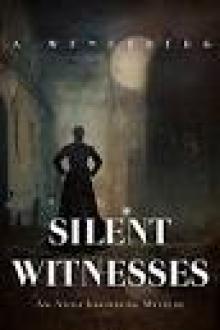 Silent Witnesses
Silent Witnesses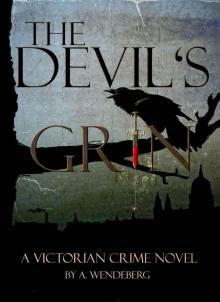 The Devil's Grin - A Crime Novel featuring Anna Kronberg and Sherlock Holmes (Kronberg Crimes)
The Devil's Grin - A Crime Novel featuring Anna Kronberg and Sherlock Holmes (Kronberg Crimes) The Lion's Courtship: An Anna Kronberg Mystery
The Lion's Courtship: An Anna Kronberg Mystery 1/2986
1/2986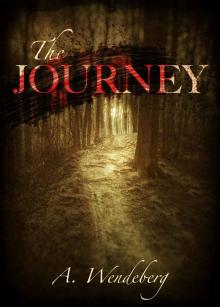 The Journey: Illustrated Edition (An Anna Kronberg Thriller)
The Journey: Illustrated Edition (An Anna Kronberg Thriller)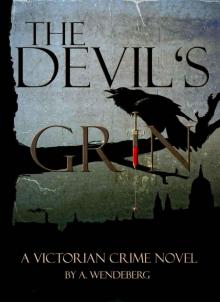 The Devil's Grin - a Crime Novel Featuring Anna Kronberg and Sherlock Holmes
The Devil's Grin - a Crime Novel Featuring Anna Kronberg and Sherlock Holmes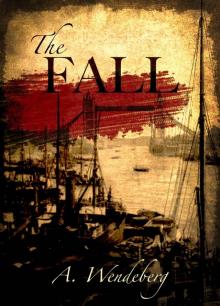 The Fall: Illustrated Edition (An Anna Kronberg Thriller Book 2)
The Fall: Illustrated Edition (An Anna Kronberg Thriller Book 2)